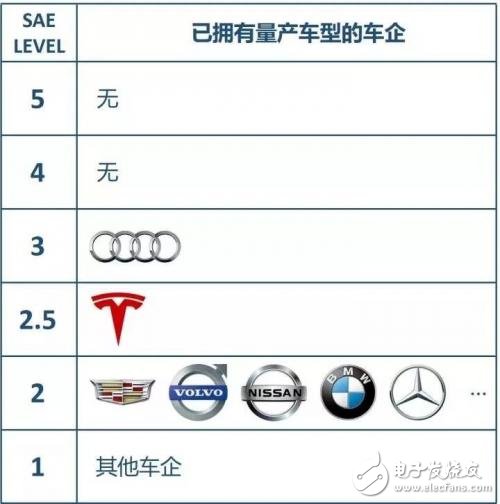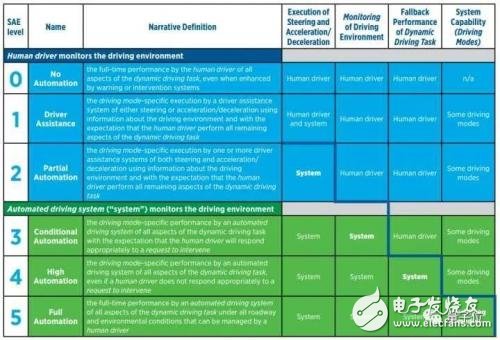When will autonomous driving hit the road? Where are you currently? When will fully automatic driving be realized? Let's first come to a hierarchical map of the autonomous driving technologies of major auto companies to get a rough idea of ​​which autonomous driving technologies are currently mass-produced. Benz: It’s a bit crowded here... Volvo: The brother next door, you stepped on my foot... Tesla: Oh, how lonely is invincibility Audi: Tesla, you know nothing about power It is a relatively long process for autonomous driving from L2 to L5. Among the mass-produced models that have been released are the Audi A8 at L3, Tesla at L2.5, and Cadillac CT6 at L2. So what are the specific differences between each level and the difficulties that need to be overcome? Then talk about it in detail. According to international practice, when talking about the level of autonomous driving, an SAE grading map is required. Let me explain to everyone What kind of technology does each level represent Which indicators can immediately distinguish which level the car belongs to Why the higher the level, the higher the technical requirements SAE Level 0: No AutomaTIon (no automation) To be precise, it is now difficult for us to see Level 0 cars. Either it has long been scrapped, or the regulations prohibit it on the road. No automation means that there is no such basic configuration as ABS (Automatic Anti-lock Brake). At the extreme, you can think of a Level 0 car as having four wheels and a sofa. SAE Level 1: Driver Assistance (driver assistance) The common cars in life are basically Level 1. Level 1 is called the driver assistance system. All functions that interfere with the driving state during the driving process are called driver assistance and all belong to Level 1. For example, the most basic ABS, and the ESP upgraded from ABS, as well as the constant speed cruise, ACC adaptive cruise function and LKA lane keeping assist commonly used in high-speed sections. When you buy a car, the various English abbreviations you see in the introduction of chassis functions are more or less Level 1 stipulated by SAE. SAE Level 2: ParTIal AutomaTIon (partial automation) The most obvious difference between Level 2 and Level 1 is whether the system can simultaneously control the vehicle horizontally and vertically. If a vehicle can achieve ACC+LKA (Adaptive Cruise + Lane Keeping Assist) at the same time, then the vehicle has stepped into the Level 2 threshold. The semi-autonomous driving system "Super Cruise" of the 2018 Cadillac CT6 is a typical Level 2 level. As you can see in the video, the car does not have the function of active overtaking. That is, the current Super Cruise can only achieve acceleration and deceleration in a single lane. Let's talk about Tesla, which must be mentioned under the topic of autonomous driving. As I said in "Internet companies and auto companies are developing autonomous driving, who do you prefer? As mentioned in ", Tesla over-exaggerated the capabilities of their system. Why is Tesla's current AutoPilot called Level 2.5? Because Tesla has a lane changing function. When the driver ensures safety, he toggles the turn signal pole, and the vehicle can change lanes based on the signal. In other words, Tesla's lane-changing operation is not fully automatic, but the need for environmental awareness is given to people. After Tesla receives the lane change signal, it will be executed after the car determines whether it is safe to change lanes. For example, the front and rear cars are too close, and the solid line will not change lanes.
Shenzhen Guan Chen Electronics Co., Ltd. is a High-tech enterprise that
integrates R&D, design, manufacture of computer peripheral products.The
products include Thunderbolt Docking Station,USB Docking Station,USB Hubs,USB
Adapter, Thunderbolt Cable , SSD Enclosure , HDD Enclosure . Our company adheres to
the principle and motto of Being sincere, Responsible, Practical to meet the
needs of markets and customers with high quality technology and management. We
commit ourselves to new product development and also stress the exploring of
international markets.
Our company owns a professional production team and establishes strict
quality control standard, so we can provide high quality products and service
for customers. We have Grapgic designer,3D Deisnger and Electronic designer to
provides professional OEM/ODM service. Our factory covers an area of 1,000-2000
spare meters, which houses 100-200 workers, so our production capacity reaches
50,000 pieces every day.With more than 10 engineers focusing on research and
development, our private model attracts much among different markets. Over 100
new designed models are released per year.There are also 3 lean production
lines to fullfill small quatity orders production for variety of models.
Our Thunderbolt 3 Docking Station has passed thunderbolt certified by
intel and apple.Our product also all can meet with CE, RoHS, UL, FCC and other
related certification.And our factory also meets legal environmental standards
ensuring your order is delivered. We have a very good reputation at home and
abroad. Our products are mainly exported to Europe, USA and Southeast Asia. We
provide one-stop-service and promote customers achieve rapidly development.
Customer comes First, Quality Ranks First, and Reasonable Price.Guanchen will
be your faithful partner from China.
Dual Protocol SSD Enclsoure,Nvme Ssd Enclosure,Aluminum External Enclosure,10Gbps External Pcie Ssd Enclosure,External Pcie Nvme M.2 Ssd Enclosure Shenzhen GuanChen Electronics Co., Ltd. , https://www.gcneotech.com
